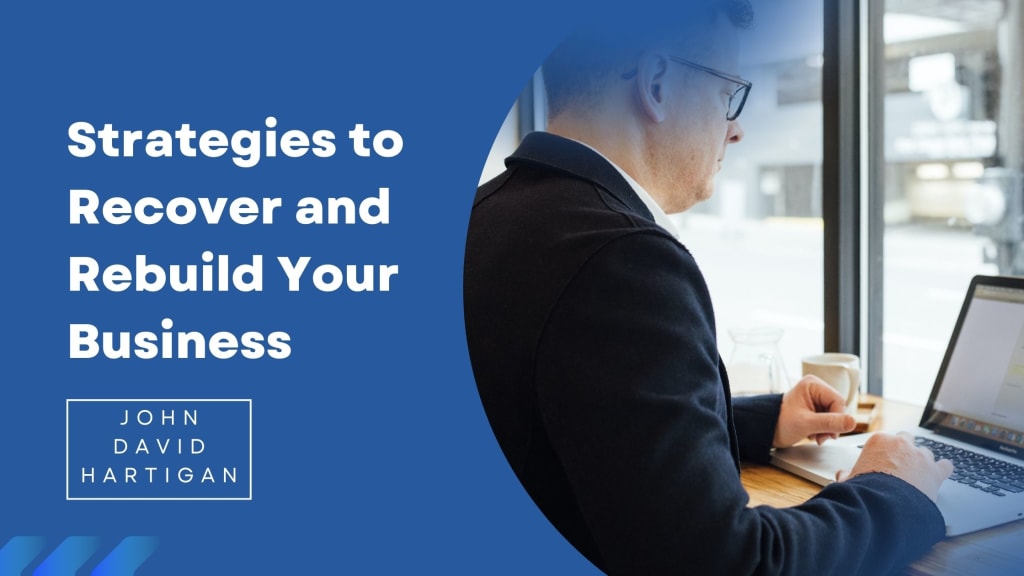Strategies to Recover and Rebuild Your Business
A Guide to Recovering from Change by John David Hartigan

Not all businesses are lucky enough to avoid strife and struggles. Many companies have to adjust and change, adapting to the environment. Just look at the changes that 2020 brought with it - the companies that found remote or distance alternatives were the ones more likely to survive.
Recovering and rebuilding can feel more challenging for small businesses, but it is still entirely possible. Remember that there is no way to predict the future. So many other companies are in the same boat as yours—and many of those survived. Read below to get some ideas on recovering and rebuilding your business.
Assessment
Before any changes are implemented, take the time to assess your business. More specifically, try to calculate the financial damage. This will help you understand how much improvement is necessary.
Likewise, this assessment can help provide some insight. As the saying goes, we learn the most from our mistakes. Consider what isn’t working for your business to decide best how to change it.
Don’t forget that this assessment should go beyond finances. How else has the business been affected? Is the customer base strong? Did the target audience change at all? What about the employees and work environment? All of these factors (and more) should be taken into account.
Financing Decisions
Once you’ve taken a good hard look at the business, it is time to ask yourself how much assistance is needed. Does the company need additional funding to get off the ground? Or can you make use of the resources already available? These are some of the first financial questions to answer.
Organizations, loans, and funding options are available to businesses recovering from certain events, such as COVID-19. There’s the Economic Injury Disaster Loan, the Paycheck Protection Program, and more. It’s potentially worthwhile to look into these programs.
Even if the business doesn’t need additional funds at this point, it is a good idea to decide how additional funding will be gathered, should it become necessary. Remember, part of running a business is all about planning.
Create a Plan
Just like when you first created the business, it is time to plan. By now, you’ve learned a lot about your business, including how it operates and what needs to change. Include these lessons into the plan, with room for growth and adaptation.
Remember to take the current environment into account when creating this business plan. Many businesses are still facing supply issues due to the pandemic. Adding a buffer time to account for inevitable delays is necessary these days.
Develop Contingency Plans
The pandemic made it clear that while it is impossible to predict everything, planning for emergencies is critical for businesses. Again, the businesses best equipped to adapt are succeeding during these uncertain times.
As such, create a contingency plan. Better yet, make several contingency plans. Again, you can’t predict everything, but you can develop several strategies to handle different sets of emergencies and changes.
Encourage Diversity
Any financial expert will tell you that the best way to protect your investments is by diversifying your portfolio. The same can hold true in a business sense as well. Create multiple revenue streams for your business. This will offer a shield, increasing the odds of success in the face of uncertainty.
Consider Alternatives
Three years ago, it was considered the business standard to have employees working in the office. Now, it is just as common (if not more common) to have a hybrid workforce or a company made entirely of remote employees.
This is a good lesson to keep in mind. Consider the alternative methods for running your business. Is there a more efficient way for your employees to get their work done? Do they need to be in the office, or is remote more sustainable?
A flexible working environment is vital for surviving uncertainty and surprises, so keep this in mind when building the business back up.
About the Creator
John David Hartigan
John D. Hartigan is the Senior Managing Director at Albion Capital Partners, LLC, a Chicago-based consulting firm. John has three decades of experience working in business and finance and an impressive record of boosting business growth.






Comments
There are no comments for this story
Be the first to respond and start the conversation.